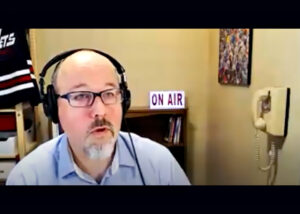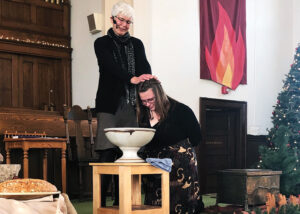I am not new to the pages of this magazine—having written columns and occasional articles for five years—but allow me to begin my new role as a regular staff writer by offering some personal comments on faith and journalism. I think journalists should generally keep themselves in the background, allowing their writing to speak for itself, but perhaps there is a time to share something of what goes on between the lines, even at the risk of appearing self-indulgent.
First, a confession: In a world cluttered with words, it is hard to improve on silence. Looking at it from the other end, I believe the best words arise out of silence. The call of a writer is to pause, ponder deeply, pause again and then write. I aim for that distant goal.
Second, I believe in candid, caring discussion. We have to talk about the tough stuff. A senior member of a Mennonite institution recently told me that important issues remain unaddressed within that institution because people are uncomfortable raising contentious issues with colleagues who are also old church friends. Like the person who shared this, I think friendships and joint membership in a faith community should enable—rather than prevent—honest discussion.
Conflict avoidance should not be mistaken for Christian harmony, nor should the raising of tough issues be mistaken for an attempt to undermine the church.
Candid discussion means asking incisive questions both of faith leaders and of ourselves as a whole. This must be done respectfully, out of genuine concern for the betterment of the faith community, not to prove someone wrong. Over my years of writing for various religious and mainstream publications, I have acted at times out of the lesser of these motives. My goal now, as it has been for some time, is to act out of the greater. This requires that I ask incisive questions of myself also.
In a 2001 essay in Harper’s Magazine, the late writer, David Foster Wallace, speaks to the importance of self-examination. As a writer, he wrote, “You have to be willing to look honestly at yourself and your motives for believing what you believe, and to do it more or less continually.”
He also called for an honest attempt to understand as fully as possible the beliefs of others, especially those with whom one disagrees. Foster Wallace admonished writers to exhibit utmost “rigour and humility” in their efforts to understand opposing views. He called for “sedulous respect for the convictions of others,” fully admitting the great challenge of the task.
For me, this means that every interview must be an attempt to understand the strongest arguments and most important messages the person brings, whether or not those views suit my fancy. Personally, I find this yields surprises, a softened approach to people and deeper understandings. This is my hope for readers, too, that whatever their views are, they will not simply become further entrenched in existing opinions, but will learn something new about themselves and others by reading Canadian Mennonite.
Among the tough issues that I think require attention are:
- The polarization that debases the politics of our age, and how the church can avoid it;
- Climate change, over-consumption, global disparity and their respective spiritual implications; and
- The prospect of a sharp decline in church numbers in coming decades.
I am pleased to work for a publication that promotes open, caring dialogue about issues such as these.
All that said, church and church publications are about more than the discussion of issues. They are about a quest for inner wholeness, oneness with God, love. Indeed, deep calls to deep, but such things are harder to write about than hot-button issues. To talk about spiritual quest in ways that avoid dull clichés, intellectualization and strictly theological perspectives is an important challenge.
How exactly do we become better Christians? How exactly do we become more forgiving, more humble, more loving, and better able to see the divine glimmer in everyone we meet? What do we do with our doubts, with the scars religion sometimes leaves, or with those elements of orthodoxy we may find hollow?
The recent death of Gene Herr—who, along with his wife Mary, introduced me and many other Mennonites to the riches of contemplative spirituality—emphasizes for me the need to explore what spiritual elders in our tradition and other traditions can teach us about prayer, contemplative silence and spiritual formation.
All these things, from greenhouse gas emissions to mystical union with God—and especially the points at which these two realms intersect—I shall ponder and invite others to ponder.








Leave a Reply
You must be logged in to post a comment.